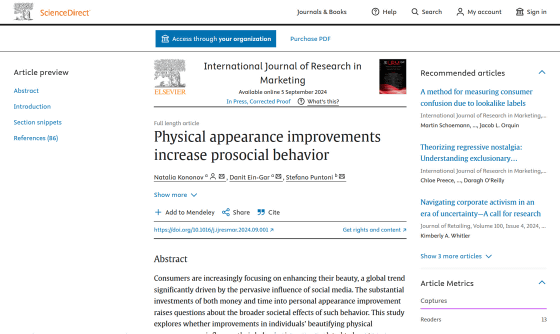Research shows that people's positive social behavior, such as donating money, increases when they look good, even with digital filters

In recent years, there has been growing criticism of
Physical appearance improvements increase prosocial behavior - ScienceDirect
https://www.sciencedirect.com/science/article/abs/pii/S0167811624000831

Self-beautifying can boost prosocial behavior — here's why
https://www.psypost.org/new-psychology-research-shows-self-beautifying-can-boost-prosocial-behavior-heres-why/
In modern society, many people participate in activities to enhance their own appearance, such as applying makeup, undergoing cosmetic surgery, or using digital filters. These behaviors are often driven by a desire to improve one's attractiveness, increase self-esteem, and gain social approval.
Previous research has shown that appearance affects self-perception and various social interactions, with reported results such as ' people tend to date members of the opposite sex who are similar in looks to themselves ,' ' how a person looks at age 15 will affect their social status in their 30s ,' and 'men who are unattractive will not be appreciated by women or their fathers .'
However, little is understood about how improving appearance affects behaviors unrelated to beauty, such as prosocial behavior, beyond the personal benefits. Therefore, the research team conducted a study to examine the effects of improving appearance on prosocial behavior.
'Trying to improve one's appearance is very common, but it's often seen negatively, associated with vanity and superficiality,' said Natalia Kononov , a co-author of the paper and a postdoctoral researcher at the University of Pennsylvania. 'We were interested to see whether this common behavior might have more positive meanings than previously thought.'

In seven experiments involving a total of 2,895 subjects, the research team investigated how improving appearance affects prosocial behaviors such as 'donating to charity' and 'choosing ethical products. These experiments included laboratory and online experiments, as well as field experiments conducted in real online environments rather than in a laboratory setting.
In some experiments, participants were asked to recall moments when their appearance had improved, such as styling their hair or putting on makeup, or to recall enjoyable activities unrelated to appearance. They were then presented with hypothetical scenarios, such as whether they would donate to a UNICEF campaign or share a link to a charity on social media, and their behavior was monitored.
The results of the experiment showed that subjects who remembered moments when their appearance had improved were consistently more motivated to engage in prosocial behaviors, such as donating money, compared to subjects who remembered enjoyable activities unrelated to appearance. Further analysis revealed that this was not simply due to improved mood, but was driven by 'how others perceived them.' These effects were not only seen in women, but also in men, who are generally said to not care about their appearance.

In another experiment, participants were asked to take photos of themselves and then apply either a photo filter that enhanced their appearance or a neutral filter to measure their willingness to engage in prosocial behavior. Those who applied the beauty filter showed higher levels of generosity in actions such as donating money, but the effect disappeared when the neutral filter was applied.
The study also found that participants needed to feel that their appearance had improved in order to be motivated to engage in prosocial behavior. It was also reported that participants were more likely to engage in prosocial behavior if their improved appearance was visible to others, not just to themselves.
Extending these findings to a real-world online environment, a field experiment asked participants to complete either a quiz designed to improve their perception of their appearance or a quiz focused on an unrelated topic, like architecture. Afterward, they were shown a donation campaign banner. Those who had completed the appearance-focused quiz were more likely to click on the banner.
'Our research shows that taking care of your appearance doesn't just boost your self-confidence, it also raises your awareness of how others perceive you,' Kononov told PsyPost. 'This increased awareness may lead to more pro-social behaviors, like donating to charity or choosing ethical brands.'

It should be noted that this study focused on temporary improvements to appearance, such as the use of makeup and digital filters, and does not know the effects of permanent or dramatic changes such as cosmetic surgery. Still, the positive effects of 'behavior aimed at improving one's appearance' are noteworthy.
'Our findings are especially relevant in today's world, where filters and selfies are an important part of social media culture. We found that changes in our physical and digital appearance shape how we see ourselves and influence our behavior toward others. This has practical implications for nonprofits and marketers, who can use these insights to design campaigns that encourage positive behavior, such as donating to charity or supporting ethical causes,' said Kononov.
Related Posts:
in Science, Posted by log1h_ik







